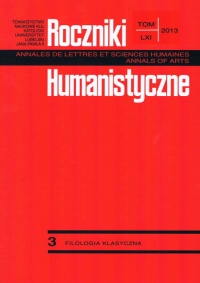The Myth of Orpheus and Eurydice in the Novel Frenzy by Percival Everett
Abstract
This paper deals with one of the most popular ancient myths among the writers of the twentieth century—namely the myth of Orpheus and Eurydice. Percival Everett, a professor of the University of California, has brought forward a new interpretation of that myth in his novel Frenzy. The main subject-matter is the story of Dionysus based on Euripides’ Bacchae, and narrated by the god’s assistant Vlepo. The myth of Orpheus and Eurydice constitutes an interlude within that story. References to Ovid and Virgil can also be found, as Everett has added fragments of Metamorphoses and Georgica to his version of the myth. His interpretation is focused on psychological aspects of the story.
Orpheus in Frenzy is a man overpowered by grief and longing. His behaviour seems to be caused by madness. This becomes especially visible when he learns of the loss of Eurydice. At the other hand, Eurydice seems to be confident of herself. She is an active person, not a passive one unlike the ancient authors have depicted her.
The novel Frenzy of Percival Everett deserves attention from scholars who study the reception of antiquity.
References
Brzuska B.: Orfeusz. Eurydyka. Hermes. Ich troje, czyli stara grecka płaskorzeźba. O motywie orfickim w opracowaniu Rainera Marii Rilkego, „Littera Antiqua” 1 (2011), s. 22-46 – http://www.litant.eu/artykuly/nr1/LA%201.pdf [dostęp 14 lutego 2013].
Everett P.: For Her Dark Skin, Seattle: Owl Creek Press 1990.
Everett P.: Frenzy, Saint Paul: Graywolf Press 1997.
Kerényi K.: Mitologia Greków, tłum. R. Reszke, Warszawa: Wydawnictwo KR 2002.
Surowska B.: Orfeusz w poezji Rainera Marii Rilkego, w: Mit Orfeusza. Inspiracje i reinterpretacje w europejskiej tradycji artystycznej, red. S. Żerańska-Kominek, Gdańsk: słowo/obraz terytoria 2003, s. 329-340.
Copyright (c) 2013 Roczniki Humanistyczne

This work is licensed under a Creative Commons Attribution-NonCommercial-NoDerivatives 4.0 International License.





